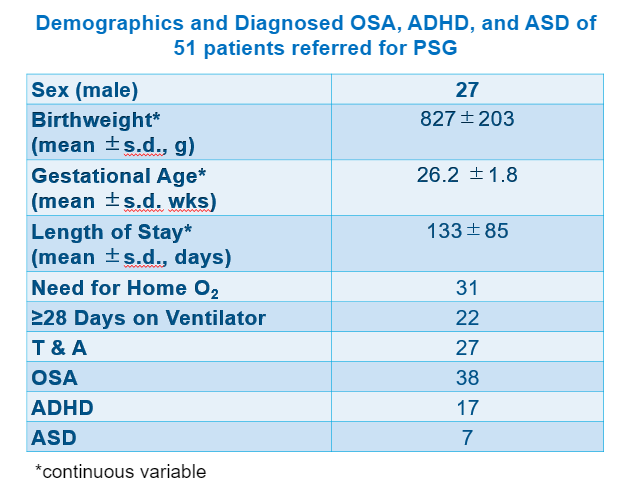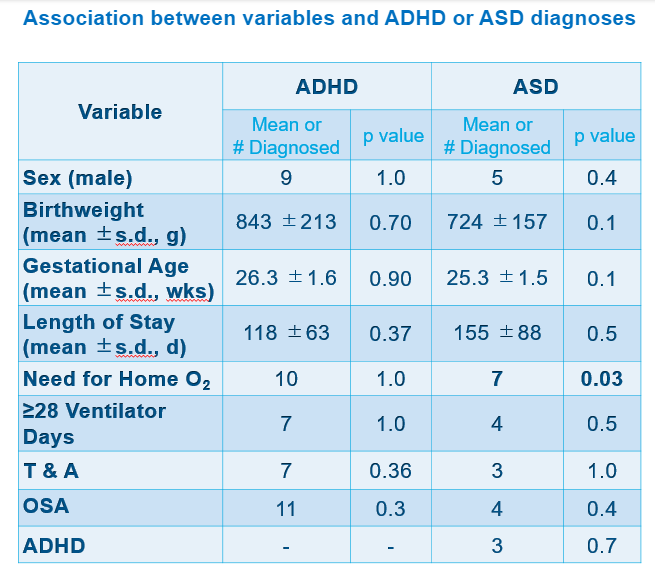Neonatology
Session: Neonatal Follow-up 4
550 - Neurodevelopmental Disorders and Behavioral Issues in Preterm Infants Less than 1250 grams Birth Weight with Obstructive Sleep Apnea and Sleep-Related Problems
Monday, May 6, 2024
9:30 AM - 11:30 AM ET
Poster Number: 550
Publication Number: 550.2892
Publication Number: 550.2892

Jerica E. Gee, MD (she/her/hers)
Fellow
Medical University of South Carolina College of Medicine
Charleston, South Carolina, United States
Presenting Author(s)
Background: Sleep is an integral part of brain development. Sleep interruption with recurrent hypoxia or frequent arousals interferes with neurodevelopment. Obstructive sleep apnea (OSA) is a sleep-related breathing disorder characterized by recurrent episodes of upper airway obstruction resulting in intermittent hypoxia, arousals, and disrupted sleep architecture. Preterm infants (PTI) are more likely to have OSA compared to their term counterparts. PTI are at already at risk for sub-optimal neurodevelopmental outcomes due to neonatal comorbidities and disrupted neuronal maturation. A strong association exists between OSA and deficits in behavior and cognition. OSA and other sleep-related issues may further contribute to neurodevelopmental disorders (NDD) such as attention deficit disorder (ADHD) and autism spectrum disorder (ASD), and behavioral issues.
Objective: To assess NDD and behavioral risk in PTI with OSA followed in single center NICU graduate clinic.
Design/Methods: Retrospective cohort study of 51 infants with birth weight (BW) under 1250g who underwent polysomnography (PSG) for sleep issues (snoring, frequent waking, restless sleep) and had evidence of OSA. OSA treatment, including tonsil and adenoidectomy (T&A), were recorded. The cohort was analyzed for rates of OSA, ADHD, ASD and parental reported scores on the Ages and Stages Questionnaires: Social and Emotional (ASQ-SE).
Results: OSA was diagnosed in 75% (38/51), and T&A was performed in 56% (29/51). 41% (21/51) were diagnosed with NDD. ADHD was diagnosed in 33% (17/51), ASD in 13.7% (7/51). Of those diagnosed with OSA, ADHD was diagnosed in 30% (11/38, p=0.3), ASD in 11% (4/38, p=0.35), and ASQ-SE scores above cutoff in 45% (17/38, p=0.02). Of those discharged on home oxygen, ASD was diagnosed in 23% (7/31, p=0.03).
Conclusion(s): Among infants born less than 1250 grams and referred for PSG, OSA was only significantly associated with ASQ-SE scores above cutoff thresholds. Need for home oxygen was significantly associated with ASD. PTI had high rates of ADHD and ASD, but rates were not associated with OSA. Other demographic characteristics studied, as well as T&A, were not associated with ADHD, ASD or OSA. Next steps are to test the hypothesis that former PTI with need for home O2 and who have sleep-related issues are at higher risk for NDD. Ongoing data collection to include children born earlier than 37 weeks from 2008-2020, and Capute Scales scores. We will also compare preterm infants referred for PSG to a matched cohort of infants without indications for referral.



